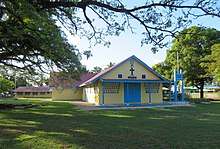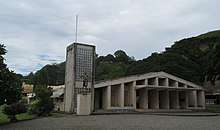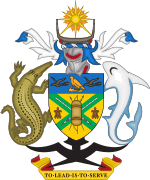Religion in Solomon Islands
The majority of the population in Solomon Islands are Christians, with a majority of Christians belonging to Protestant churches. The constitution of Solomon Islands establishes the freedom of religion, and this freedom is respected in practice by both the government and general society.
Demographics


Religious makeup of the population of Solomon Islands as of 2007:[1]
- Christianity 92%
- Protestant 73%
- Anglican Church of Melanesia 35%
- South Seas Evangelical Church 17%
- United Church in Papua New Guinea and the Solomon Islands 11%
- Seventh-day Adventist Church 10%
- Roman Catholic Church 19%
- Protestant 73%
- Animism 5%
- Other 3%
An estimated 5 percent of the population, consisting primarily of the Kwaio community on the island of Malaita, practice indigenous animistic religions.[1] Groups that together constitute less than 5 percent of the population include the Ahmadiyya Muslim Community[2] and other Muslims, the Baha'i Faith, Jehovah's Witnesses, the Church of Jesus Christ of Latter-day Saints (Mormons), Unification Church, and indigenous churches that have broken away from the major Christian denominations.[1] There are believed to be members of other religious groups within the foreign community who were free to practice, but they are not known to proselytize or hold public religious ceremonies.[1] According to the most recent reports, there are approximately 350 Muslims.[1]
Christianity was brought to the country in the 19th and early 20th centuries by missionaries representing several Western denominations.[1] Some foreign missionaries continue to work in the country. Except for the Roman Catholic Church, whose clergy is approximately 45 percent foreign, the clergy of the established churches is nearly entirely indigenous.[1]
Religious freedom
The constitution of the Solomon Islands establishes the freedom of religion, although it also allows for this freedom to be curtailed when "reasonably required" by other laws.[3]
All religious organizations are required to register with the government.[3]
The public school curriculum includes an hour of optional weekly religious education, with the content determined by the Solomon Islands Christian Association. Non-christian religious instruction is available by request. The government subsidizes schools and health centers operated by religious organizations, in addition to providing small grants to religious organizations.[3]
Leaders of minority groups in the Solomon Islands have reported no incidents of religious discrimination as of 2017.[3]
See also
- Roman Catholicism in Solomon Islands
- Islam in Solomon Islands
References
- International Religious Freedom Report 2007: Solomon Islands. United States Bureau of Democracy, Human Rights and Labor (September 14, 2007). This article incorporates text from this source, which is in the public domain.
- Ahmadiyya Solomon Islands
- International Religious Freedom Report 2017 § Solomon Islands, US Department of State, Bureau of Democracy, Human Rights, and Labor.
